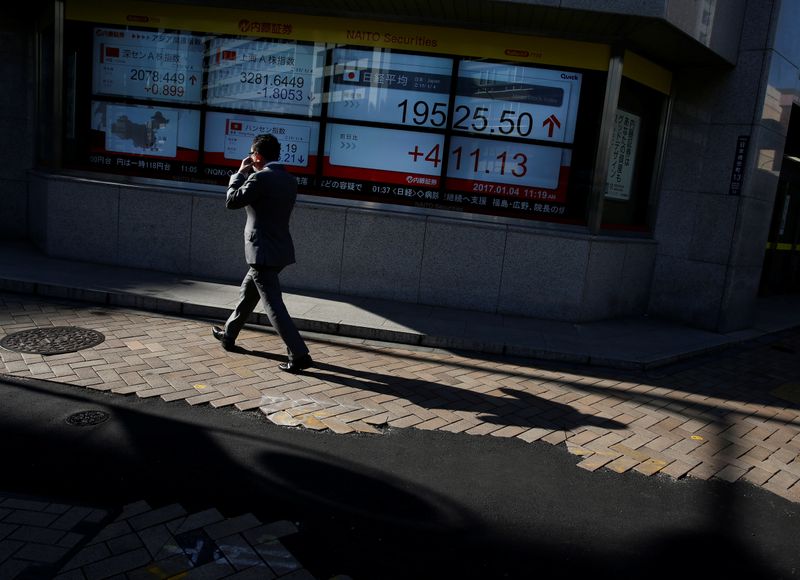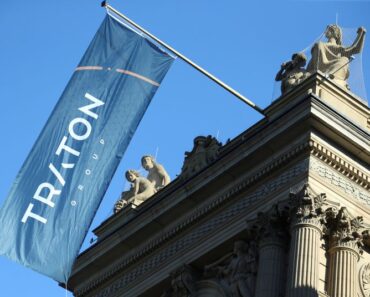This post was originally published on this site
 © Reuters. FILE PHOTO: A man walks past an electronic board showing stock prices outside a brokerage in Tokyo
© Reuters. FILE PHOTO: A man walks past an electronic board showing stock prices outside a brokerage in TokyoBy Anshuman Daga and Hideyuki Sano
SINGAPORE/TOKYO (Reuters) – Global stocks and oil prices extended gains on Tuesday as policymakers indicated their willingness to help ease the economic fallout from the coronavirus, while worries about the outcome of a call by Group of Seven heads kept a lid on gains.
Finance ministers from the group and central bank governors will hold a conference call on Tuesday (1200GMT) to discuss measures to deal with the outbreak. But according to a source at the group, a statement it is crafting does not detail any fiscal or monetary steps.
The decision to hold a call came after the European Central Bank on Monday joined the chorus of central banks signaling a readiness to deal with the threat from the outbreak.
“This is a tug of war between hope and fear. Central banks are giving hopes with their potential stimulus but we haven’t seen any firepower yet,” said Vasu Menon, senior investment strategist at OCBC Bank Wealth Management.
“The question is what they will do? Monetary policy is already very loose and interest rates are very low,” he said.
Earlier messages from the U.S. Federal Reserve that it was prepared to act weighed on the greenback.
The improved sentiment helped U.S. climb up as much as 1% in Asian trade on Tuesday but they trimmed gains to 0.1% following news on the G7 draft statement.
European stock futures indicated a strong open for European markets. and German both added 0.8% while futures were up 0.7%.
MSCI’s broadest index of Asia-Pacific shares outside Japan advanced 0.7%, paring the day’s gains but still marking the second straight session of rises.
“Barring any further deterioration of the coronavirus outbreak, we believe that the global cyclical recovery is likely to gain further momentum,” Schroders’ Asian multi-asset team said in a report.
“This is likely to benefit stocks with higher leverage to global growth, as stronger earnings could support dividend growth.”
MONEY MARKETS
Japan’s lost steam and closed 1.2% lower after short-covering ran its course and as the yen firmed on the dollar, but South Korea’s Kospi rose 0.4%.
Australian shares ended down 0.7%, with bank shares easing after the central bank cut interest rates to a record low of 0.5%, the fourth reduction in less than a year.
The rout in global stocks last week had already prompted Fed Chair Jerome Powell and Bank of Japan Governor Haruhiko Kuroda to flag a readiness to move. Money markets are fully pricing in a cut of at least 0.25 percentage point to the current 1.50%-1.75% target rate at the Fed’s March 17-18 meeting as well as a 0.10 percentage point cut to the ECB’s key rate at March 12 meeting.
The frantic moves by policymakers reflected growing fears that the disruption to supply chains, factory output and global travel caused by the new epidemic could deal a serious blow to a world economy trying to recover from the U.S.-China trade war.
Coronavirus is now spreading much more rapidly outside China than within the country, leading the world into uncharted territory, although the World Health Organization has so far stopped short of calling it a pandemic.
FED RATE CUTS
The rebound in global stock prices saw U.S. bond yields roll back some of their sharp falls.
The 10-year U.S. Treasuries yield retreated to 1.1174% from a record low of 1.030% marked on Monday. The rate-sensitive two-year notes yield jumped back to 0.8452% from Monday’s 3 1/2-year low of 0.710%.
April Fed funds rate futures still price in about 80% chance of a 0.50 percentage point cut this month and a total of almost 1 percentage point cuts by the end of year.
Expectations of Fed rate cuts prompted investors to cut their exposure to the dollar.
Against the yen, the dollar lost 0.5% to 107.8 yen, slipping towards a five-month low of 107 set on Monday.
The euro was a shade higher at $1.1146, having hit an eight-week peak of $1.1185 in the previous session.
The Australian dollar sat above a recent 11-year trough largely on short covering after the cut in interest rates.
Oil prices gained, although they came off day’s highs, after a jump of more than 4% on Monday. U.S. West Texas Intermediate crude futures rose 1.4% to $47.4 a barrel. was up 1.16 % to $52.43. [O/R]


